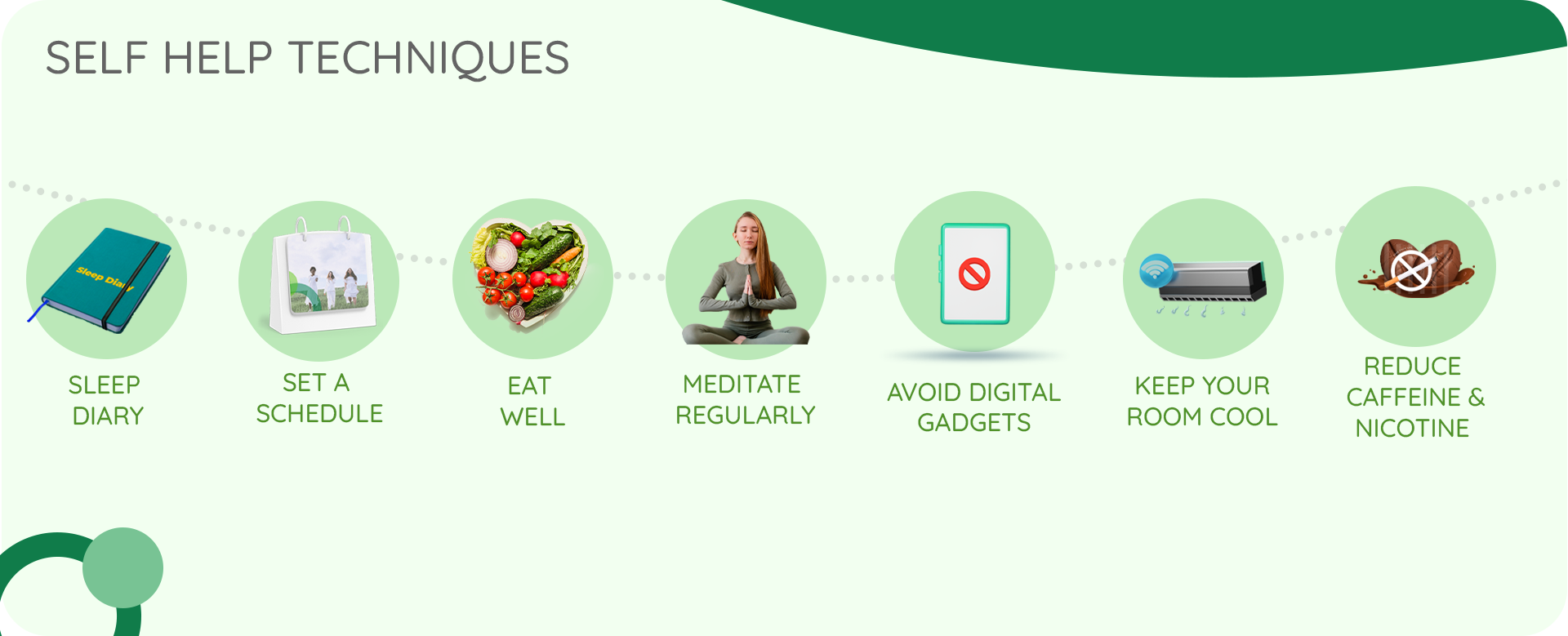Overview
- Insomnia is a sleep disorder that affects nearly 30% of US adults in short-term and 10% of adults in long-term.
- Insomnia disorder involves daytime impairments as well as nighttime sleep difficulties.
- Insomnia causes can include physical changes to sleep habits, psychological issues, and some medications. Moreover, stress, anxiety, and depression can be devastating for sleep.
- It can be a serious problem if it interrupts your sleep for more than three days a week for three months.
- A healthy adult requires a minimum sleep of 7 hours every day to function its body normally.
- Insomnia treatment includes behavioral or pharmacological therapy.


People who experience insomnia couldn’t have enough rest. According to the American Psychiatric Association (APA), insomnia is the most common sleep disorder and 1/3rd of adults suffer from insomnia once in their lives. And, nearly 10% of people have severe insomnia disorder.
Remember that a few restless nights doesn’t mean you are experiencing insomnia. APA describes that insomnia definition includes the duration of the problem with its severity. To get diagnosed with insomnia a person must have had:
- Sleep problems for at least three nights a week for three months.
- Sleep difficulties are severe enough to cause distress in routine.
Insomnia can be mild, moderate, or chronic. For all these categories, different interventions may be used to provide help.
Symptoms of Insomnia
Insomnia is not limited to a lack of sleep. Its symptoms can vary from person to person. Insomnia symptoms can include:
- Difficulty falling asleep at night
- Waking up during the night
- Waking up early
- Daytime tiredness
- Irritability, anxiety, or depression
- Difficulty focusing on tasks
- Increased errors or accidents
- Constant worries about sleep
- Not feeling well-rested after having a night's sleep
If these symptoms are present in a person for more than three months, they should immediately consult a doctor. Also, if you can’t sleep for more than 3 nights continuously, it might be the right time to visit a doctor.
What Causes Insomnia?
There are several reasons for why you can’t sleep well. The sleep problem can be primary or caused by something else happening in your body.Unhealthy habits related to lifestyle and food and drink can increase a person’s risk of having insomnia.
For every person, the trigger for insomnia is different. The causes of insomnia can be:
- Stress about life and decisions
- Travel schedule
- Overbearing work habits
- Poor sleep habits
- Poor dietary habits like eating too much or too little
- Mental health disorders
- Drugs or medications
- Health issues
- Caffeine, alcohol, or nicotine
- Aging
- Changes in physical activity
Physiological and Cognitive Causes
Preoccupation with sleep and distress due to the inability to sleep may cause a vicious cycle: the more the individual struggles to sleep, the more frustration develops and further impairs sleep. Therefore, excessive struggles to sleep, which override the normal sleep-onset process, may cause the development of insomnia.
Individuals with persistent insomnia may also be involved in maladaptive sleep habits and cognitions such as:
- Spending excessive time in bed
- Following an irregular sleep schedule
- Napping
- Fear of sleeplessness
- Clock monitoring
Some people are more likely to suffer from insomnia than others. Risk factors for insomnia are:
- Being a woman
- Age above 60
- Health issues
- Lack of regular schedule
- Being under stress
How Much Sleep Should You Be Getting Every Night?
The American Academy of Sleep Medicine (AASM) recommends the following durations of sleep for people of different ages when it comes to healthy sleep.
| Age | Recommended Duration of Sleep in 24 Hours |
| Infants (4-12 months) | 12 to 16 hours |
| Children (1-2 years) | 11 to 14 hours |
| Children (3-5 years) | 10 to 13 hours |
| Children (6-12 years) | 9 to 12 hours |
| Teenagers (13-18 years) | 8 to 10 hours |
| Adults (18 and above) | 7 to 8 hours |
Why Is Sleep Important?
Sleep is one of the most fundamental biological processes in the human body. Without sleep, a person can suffer from the body’s inability to regulate different functions, deterioration of health and overall wellbeing. It can make your reflexes slow, your energy levels lower, and difficulty understating, thinking, learning, or reacting. This means that getting sleep during 24 hours is essential.
When a person sleeps, his or her body works to support and maintain brain and physical health. For children, it can mean effective growth and development. When you sleep, your brain works to formulate, remember, and organize memories. It increases your ability to learn and solve problems.
Not only cognitive functions but physical health is also affected by how well you sleep. During sleep, the body heals and repairs any damage in the body. Lack of sleep has been associated with an increased risk of stroke, hypertension, diabetes, heart disease, and even kidney disease.
Insomnia Treatment
Now that we understand insomnia's meaning, let us look at the ways a doctor may try to help you with your insomnia and provide effective treatment. Based on the category of insomnia you have, the treatment can differ.
| Type of Treatment | Can Include |
| Non-pharmacological approach | In this approach, the doctor or sleep specialist can recommend that you try short or long term cognitive-behavioral therapies like:
|
| Pharmacological approach | Medication to treat insomnia is restricted to most severe and chronic cases. The type of drugs prescribed by a doctor can vary.
The first-line drug therapy can include:
|
Common Expert Suggestions on How to Fall Asleep?
You cannot treat insomnia yourself and need the help of a doctor who is qualified and is an expert in this field. However, there are some ways that you should try to get a good night’s sleep that are endorsed by several experts.
In order to improve your sleep patterns following may help you improve your sleep habits:
- Try to go to sleep at the same time every night. Regulating daytime naps and bedtime can help you become in sync with your internal clock.
- Stop using screens a few hours before you go to bed. Artificial bright light can disrupt sleep patterns.
- Avoid strenuous exercise, excessive caffeine, nicotine, and alcohol. Everything in moderation can help. Limiting stimulants to the early day can help regulate the sleep cycle as well.
- Try a hot bath before you go to sleep or meditate.
- Be physically active
- Avoid huge meals a few hours before bedtime. Similarly, do not go to bed with an empty stomach.
- If you have trouble falling asleep at night, avoiding naps in the day might be a good idea.
- Keep the room you sleep in cool, dark, and quiet.
These suggestions are for people who find it difficult to sleep generally. If you have a serious sleep issue for more than three nights in a row, consult a doctor immediately.

We advise you to keep a sleep diary so that you can provide your doctor with accurate information that can help with the diagnosis of your sleep disorder.
Many of you might not be in an area where you can access quick and efficient healthcare services. Others might have transportation issues or a physical disability. COVID-19 pandemic has also disrupted the normal functioning of many hospital services as well. You can easily consult a doctor, get a prescription, and suggestions on which tests to get online from a medical expert at Omni help.

In such a case you can access a qualified doctor online and have an online medical consultation in the safety of your own house.
If you want to talk to a doctor online right now or set up a virtual doctor appointment, click down below.
If you stay awake in your bed all night, can wake up early, and then have difficulty sleeping again, you may have insomnia. It is more likely if you find it difficult to sleep even when you are tired.
Yes, women are more likely to suffer from insomnia than men. Women have a 40 percent increased risk of insomnia in their lifetime.
According to health experts, you might have chronic insomnia if you find it difficult to sleep or stay asleep for three nights a week over three months. You should seek immediate help if you suffer from chronic insomnia.
If the room you are sleeping in is too hot or cold, you might find it difficult to sleep. According to the sleep foundation, to get the best sleep you should set the room temperature at 60 to 67 degrees Fahrenheit.
There can be many reasons as to why you cannot sleep. It could be physical, psychological, or environmental issues. You might be experiencing stress, anxiety, jet lag, some serious health condition, or may have consumed some food (caffeine) or medication that may be interfering with your sleep cycle.
Research shows that if you suffer from long-term sleep loss and sleep disorder, you increase your chances of getting serious health conditions like diabetes, depression, obesity, high blood pressure, stroke, and heart attack.
Yes, any factor which might be physical or psychological in nature can trigger insomnia suddenly.
Join Our Newsletter Now
Subscribe to get information about Omni Help
